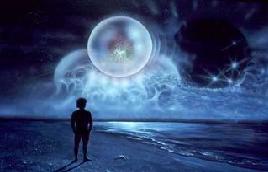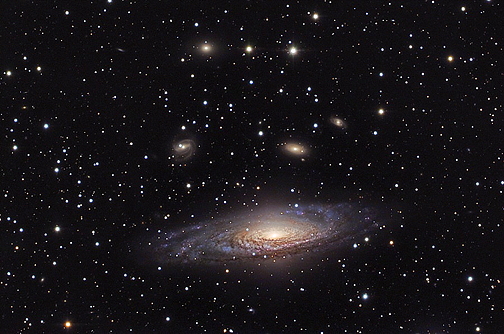

| Visitors Now: | |
| Total Visits: | |
| Total Stories: |

| Story Views | |
| Now: | |
| Last Hour: | |
| Last 24 Hours: | |
| Total: | |
Chet Raymo, “Pointless? They Don’t Know Neither Do I So There You Are”
by Chet Raymo
“Theresa drew our attention to the Templeton Foundation’s two-page ad the New York Times that gave the responses of a dozen prominent scientists and scholars to the question “Does the universe have a purpose?” You can read the complete essays here. I am reminded of a previous Musing* in which I put the question to three famous (fictional) characters. Specifically, I asked for a response to Nobel prize-winning physicist Steven Weinberg’s famous remark near the end of his 1977 best-selling book, “The First Three Minutes”: “The more the universe seems comprehensible, the more it also seems pointless.”
Knowing the point can be consoling, I suppose. It can also be dangerous to those who know a different point, or who don’t know the point at all. Everywhere in the world today where there is intolerance and violence, it is practiced by people who are convinced they know the point. But what about Weinberg’s point- that the universe appears to be pointless? Although we may come to know the foundational laws of nature, those laws appear to be quite impersonal, he says, “not showing any sign of concern for human beings.”
A Nobel Prize in physics doesn’t make you a good philosopher, but Weinberg is certainly correct when he says that science provides no evidence of a point to the universe, other than the amazing and mysterious laws themselves. Science has been fabulously successful at figuring out how the world works, and nowhere does science invoke purpose. Nowhere does it make reference to the meaning of human life. In fact, the scientific method works so well precisely because it eschews purpose. If purpose was all we used to explain the world, we would still be living in the Stone Age.
Of course, science doesn’t take the full rap for suggesting that the universe is pointless. Shakespeare’s Prospero said it, too, in the “Tempest”:
․
The solemn temples, the great globe itself,
Ye all which it inherit, shall dissolve
And, like this insubstantial pageant faded,
Leave not a rack behind.”
Rationalists since the dawn of time have purported to see a world of sound and fury, signifying nothing. But if science discerns no evidence of a point, neither can it disprove a guiding purpose to the universe. As far as I’m concerned, this whole business of requiring a point is pointless, Why should a finite human brain be able to fully comprehend a universe that may be infinite in both space and time?
Steven Weinberg doesn’t think there is a point to the universe, but his view of the world is nevertheless benign. “We can decide for ourselves which of our inherited values to hold onto, such as loving each other, and which to abandon, such as the subordination of women,” he wrote in the New York Review of Books. His views are not unlike those of the highest spirits of all religions who have looked for purpose in tolerance and love.
Whether or not the universe has a point, it certainly seems inclined to construct islands of complexity in a sea of increasing disorder. Humans are the most complex things we know about in the universe, and the only creature we know of who wonders whether the universe has a point. With conscious awareness comes – apparently unbidden, but that’s another story- a sense of moral responsibility for each other and for the planet. Peace on Earth, good will to all: Now that’s a point, which all of us- atheists, agnostics and people of faith- can share.”
In a book of interviews published 13 years later, Alan Lightman and Roberta Brawer asked 27 famous cosmologists for their responses to to Weinberg’s remark. Some of the cosmologists agreed with Weinberg. Some emphatically disagreed. Responses ranged from traditional religious affirmation to total indifference. Apparently, 27 of the world’s most brilliant mathematicians and physicists are no better than the rest of us at figuring out the human meaning of the universe.
It occurred to me that I might confront some ordinary people, kids even, with Weinberg’s remark and record their reactions. For my first interview I called Molly Bloom, an old friend in Dublin, Ireland. It was very late at night when I spoke to Molly on the phone (I had forgotten the five hour time difference). We talked about nature a bit, and what it all might mean. When I quoted Weinberg’s remark she responded with some agitation:
“God in heaven there’s nothing like nature the wild mountains then the sea and the waves rushing then the beautiful country with fields of oats and wheat and all kinds of things and all the fine cattle going about that would do your heart good to see rivers and lakes and flowers all sorts of shapes and smells and colours spring up even out of the ditches primroses and violets nature it is as for them saying theres no God I wouldn’t give a snap of my two fingers for all their learning why don’t they go and create something I often asked him atheists or whatever they call themselves go and wash the cobbles off themselves first then they go howling for the priest and they dying and why why because they’re afraid of hell on account of their bad conscience ah yes I know them well who was the first person in the universe before there was anybody that made it all who ah that they don’t know neither do I so there you are they might as well try to stop the sun from rising tomorrow…”
Excited by Molly’s unpunctuated enthusiasm, I gave a call to Huck Finn, a friend of my youth from Hannibal, Missouri. How did he respond to Weinberg’s impression of pointlessness, I asked. Huck was thoughtful, and then answered by recalling something that happened when he and a pal named Jim were drifting down the Mississippi River on a raft. “It’s lovely to live on a raft,” said Huck, his voice choked with nostalgia. “We had the sky up there, all speckled with stars, and we used to lay on our backs and look up at them, and discuss about whether they was made or only just happened.”
My conversation with Huck reminded me of another friend of my youth, a kid from an asteroid called B-612, if I remember rightly. I never knew his real name; we called him the Little Prince. Now it happened that he was in the neighborhood for another visit, so I gave him a buzz. We chatted for a while, recalling our earlier affection for one another. Then I quoted Steven Weinberg: “The more the universe seems comprehensible, the more it also seems pointless.” He laughed, and said, “Where I live everything is so small that I cannot show you where my star is to be found. It is better, like that. My star will be just one of the stars, for you. And so you will love to watch all of the stars in the heavens.”
I wasn’t sure I understood his meaning. “All men have the stars,” he continued, “but they are not the same things for different people. For some, who are travelers, the stars are guides. For others they are no more than little lights in the sky. For others, who are scholars, they are problems.” “Like for my twenty-seven cosmologists,” I ventured. “All these stars are silent,” said the Little Prince, his voice so soft and gentle I could barely make it out over the noisy telephone line. “You- you alone- will have the stars as no one else has them.”
I was still perplexed. I did not exactly see what this had to do with finding a human meaning in the universe of galaxies. “In one of the stars I shall be living,” he said. “In one of them I shall be laughing. And so it will be as if all the stars were laughing when you look at the sky at night…You- only you- will have stars that can laugh!” And he laughed again.”
●
If you had not already guessed, the responses from my “interviewees” are drawn from:
James Joyce, “Ulysses”.
Mark Twain, “Huckleberry Finn”.
Antoine de Saint Exupery, “The Little Prince”.
2012-10-17 06:03:24
Source:




